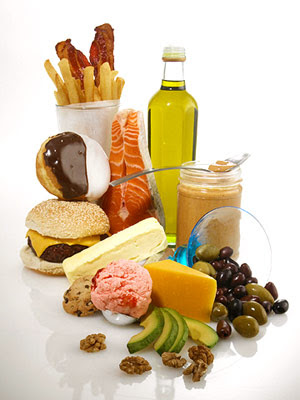Carbohydrates
Carbohydrates are compounds consisting
of carbon, hydrogen, and oxygen atoms bound together in chains of varying
lengths.
Sugars are simple carbohydrates. Simple
sugars, such as glucose, are small compounds containing 6 carbon atoms. Table
sugar, or sucrose, is a larger sugar molecule with 12 carbon atoms. Sugars are
found in sweets and, to a lesser extent, in fruits and vegetables.
Starches are complex carbohydrates
consisting of long chains of simple sugars bound together. They are found in
such foods as grains, bread, peas and beans, and many vegetables and fruits.
Carbohydrates are the body’s most
important source of food energy. Fats and proteins can also be burned for
energy, but the body uses carbohydrates first. If no carbohydrates are
available, the body then burns fat. However, if fats are burned with no
carbohydrates present, toxic compounds called ketone bodies are produced. If
too many ketone bodies accumulate, a condition called ketosis develops, and the
blood becomes unable to carry oxygen properly. The result can be fatal. Thus,
one of the important functions of carbohydrates is to help the body burn fat
properly. About 50 to 100 grams of
carbohydrates are needed every day to
prevent ketosis.
Most authorities believe that complex
carbohydrates, especially those from whole grains and unrefined foods, are
better for you than simple carbohydrates. This is partly because starchy foods
also have many other nutrients, while sweets have few other nutrients.
Also, there is some evidence that a lot
of sugar in the diet may contribute to heart and circulatory diseases. Simple
sugars and refined starches are primary sources of empty calories.
Another reason that carbohydrates from
whole grains and unrefined foods are preferable to those from refined sugars
and starches is that these unrefined foods are sources of fiber. The term fiber
refers to a group of carbohydrates that cannot be absorbed and used by the
body. Therefore, fiber supplies no food energy. However, it is important for the
proper functioning of the intestinal tract and the elimination of body waste.
In addition, there is evidence that sufficient dietary fiber helps prevent some
kinds of cancers and helps decrease
cholesterol in the blood. Fruits and vegetables, especially raw, and whole
grains supply dietary fiber.
Fiber can be classified as either
soluble or insoluble. Soluble fiber absorbs water and forms a kind of gel. It
is found inside and between plant cells. Insoluble fiber also absorbs water,
but less, and forms bulk in the intestines. It is found in cell walls and other
structural parts of plants.
[source: professional cooking sixth edition]





.jpg)


